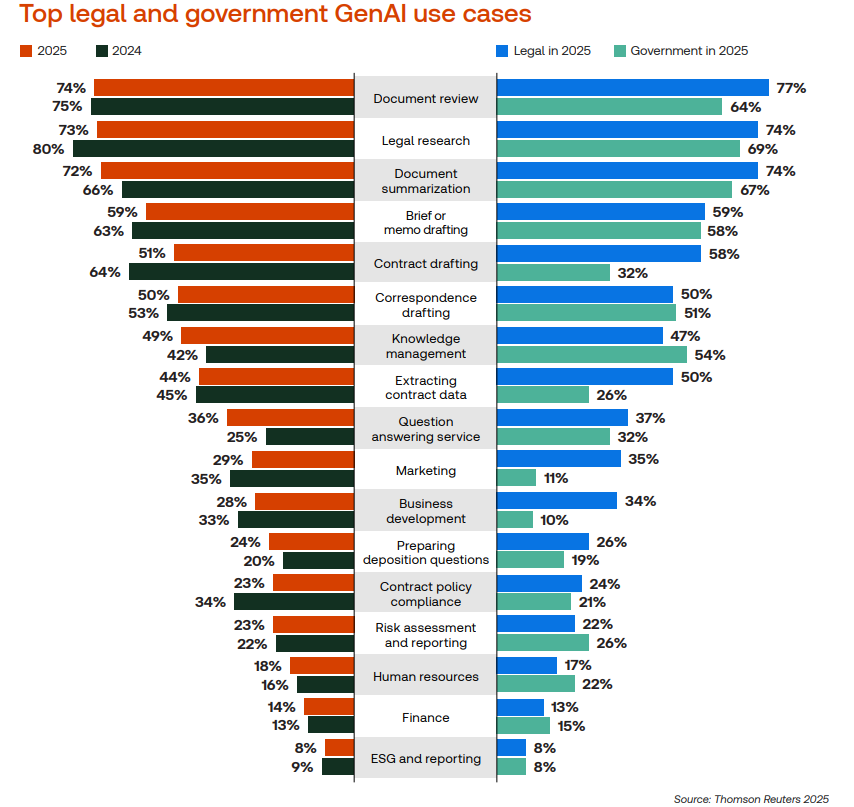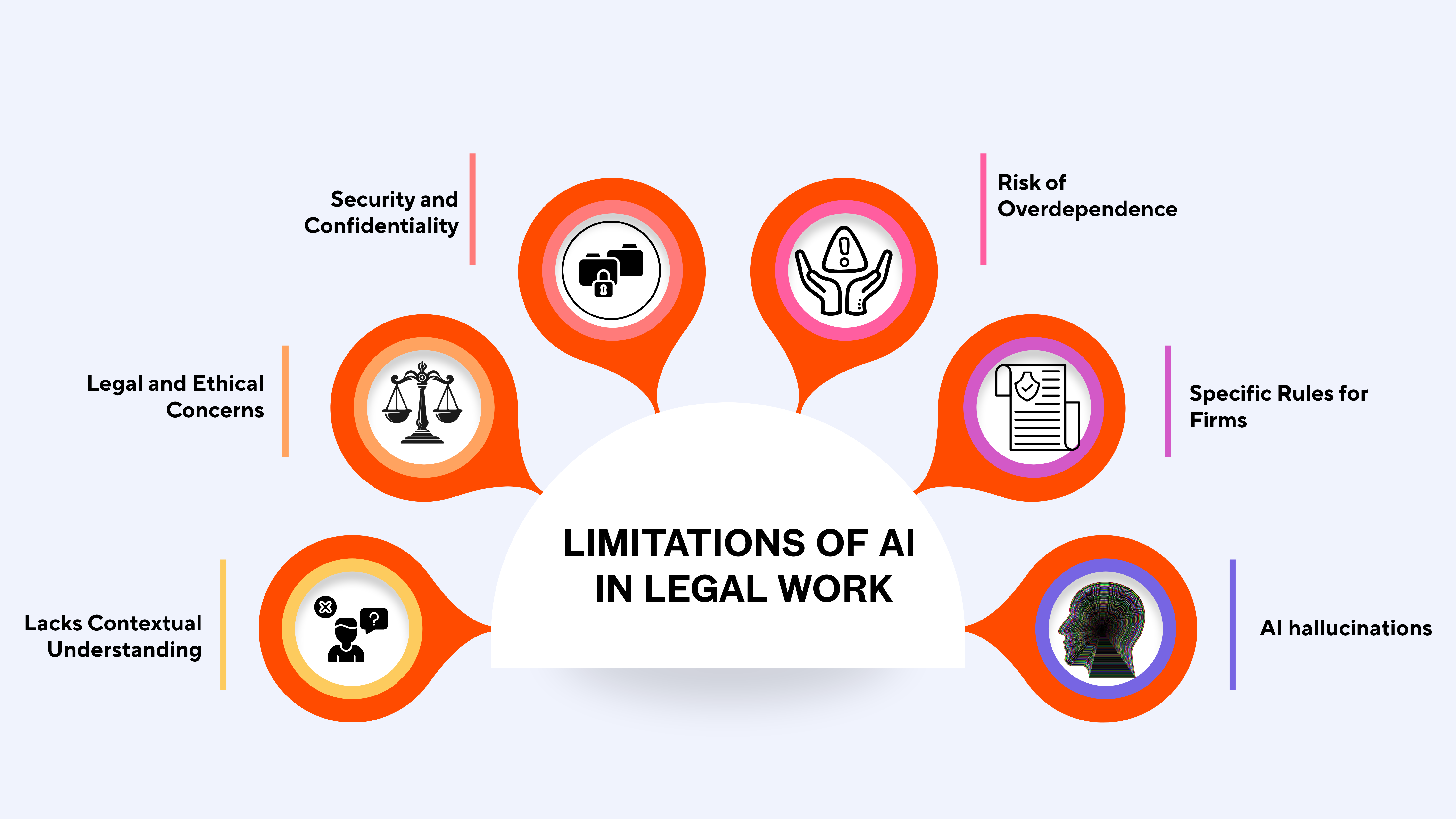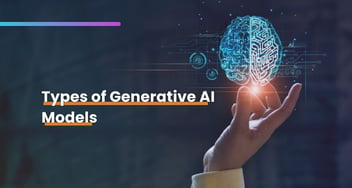AI for Legal Research in Modern Law Practice
AI enables faster, more accurate, and more strategic legal research. It uses tools like natural language processing, machine learning, and predictive analytics. AI automates routine tasks, provides deeper insights, and enables lawyers to make more informed predictions. This allows lawyers to offer more value to their clients.

Your legal team spends a lot of time searching through case files, precedents, and regulatory updates to find one relevant clause. By the time their analysis reaches you, the opportunity or risk may have already changed.
This is the reality of traditional legal research. It is slow, costly, and relies heavily on human effort. AI solutions for legal research can help with this. According to a recent report, 79% of legal professionals already use AI in some way, and about 84% expect its use to grow. This indicates a shift in how legal work connects with business goals like speed, cost control, and competitive advantage.
With the right AI solutions for legal research, you can move from spending time on details to gaining a broader perspective. This frees your legal team from routine tasks and allows them to focus more on advising you about risks, opportunities, and business decisions.
In this blog, we will explore how AI solutions for legal research work in practice and how to get started.
 Generate
Key Takeaways
Generating...
Generate
Key Takeaways
Generating...

-
AI technology can make legal research easier by automating tasks, saving time, and providing accurate insights.
-
There are significant risks like AI hallucinations and data privacy issues. This means we need strong ethical guidelines and best practices.
-
The most effective and responsible way to use AI in law is by involving lawyers in the process. Reliable AI tools should support lawyers' expertise, not replace their judgment.
What is AI Legal Research?
AI legal research uses various technologies to automate and simplify tasks like identifying legal issues and finding primary law sources. It can also analyze large amounts of legal data to improve the efficiency and accuracy of legal work. Unlike basic keyword searches, AI helps legal professionals find relevant answers more quickly. Its role is to support legal research, not to replace it.
How AI Changes Legal Research?
AI helps with legal research using trending technologies like Natural Language Processing (NLP), Machine Learning (ML), and smart search engines. Here is how these approaches help in improving the legal research industry.
1. Natural Language Processing: NLP lets AI read and analyze legal documents, making the review process easier.
2. Machine Learning: ML analyzes numerous legal cases, identifies patterns, and can predict outcomes with accuracy. This helps lawyers make better decisions and plan for the future.
3. AI-Powered Search Engines: AI speeds up case analysis using various legal research tools, saving time and effort by providing detailed and accurate insights.
Don’t Let Data Drown Your Legal Team
AI can cut through complexity and surface the insights that actually matter to your case or compliance.
How to Use AI for Legal Research?
AI is changing how legal research is done, becoming a helpful tool for legal professionals. It provides advanced tools that help legal professionals find information, plan strategies, and communicate with clients. Here is how AI automates legal research.

Source
1. Advanced Legal Search
AI improves traditional search methods by understanding the context of legal questions. This leads to more accurate results from extensive legal databases. Unlike basic keyword searches, AI takes into account the specifics of legal language and researchers' needs. This helps professionals quickly find relevant case law, statutes, and legal commentary, speeding up the research process.
2. Legal Issue Identification
AI can review legal documents and case summaries to find and categorize key legal issues. This allows researchers to quickly see the main legal questions in a case or issue. Automating this process helps professionals focus on detailed analysis and strategy instead of manually searching through documents.
3. Automated Document Review
AI can quickly scan and analyze large amounts of documents during discovery. It identifies key evidence and flags potential issues to save time and effort. AI is also used for contract review to spot risks and ensure compliance.
4. Legal Research and Analysis
AI tools can search large databases of case law, statutes, and regulations in seconds. They can analyze patterns in case law to provide valuable insights, keeping legal teams updated on real-time precedents.
5. Predictive Analytics
AI can look at past data to predict possible case outcomes and assess risks. It helps lawyers understand how a judge might react to certain arguments.
6. Document Summarization and Drafting
AI can summarize complex legal stories and opposing views. It also helps draft legal documents such as memos, briefs, and contracts based on templates.
7. Due Diligence and Compliance
AI tools can conduct thorough reviews for due diligence and compliance. They help identify risks and keep track of regulatory changes.
Discover What AI Can Do for Your Legal Department
From predictive insights to document automation, AI can unlock unprecedented efficiency. Start small, scale fast, and transform your legal research process.
Benefits of Artificial Intelligence in Legal Research
Generative AI can provide several potential benefits for law practices, including drafting assistance and ongoing support. Here are some of the benefits of using AI for legal research:
Identifies Relevant Sources of legal content.
AI tools help find important cases, laws, legal questions and additional resources related to cases and other legal issues.
Assists in Drafting
AI can create initial drafts of documents like memos, contracts, or client emails, improving client service and saving time on everyday writing tasks.
Boosts Efficiency
AI can speed up tasks related to litigation that usually take hours, like reviewing documents or summarizing cases.
Helps with Document Reviews
AI can review various legal documents by pointing out inconsistencies, summarizing content, and highlighting key terms or potential problems.
Simplifies Complex Topics
Several generative AI tools can explain legal concepts in simpler terms, improving communication with clients.
Precision and Dependability
AI uses NLP and machine learning to understand legal texts better. This helps improve accuracy and reduces mistakes that can happen due to tiredness or bias. A legal intelligence platform can quickly review thousands of sources to provide summaries, connections, and suggestions. For example, it can identify relevant court cases, even those that are no longer valid, and find related cases.
Predictive Insights and Strategy
AI looks at past data, like court decisions and legal cases, to predict how future cases might turn out and to identify potential risks. This helps lawyers create better strategies by showing them likely patterns in how judges and opposing lawyers will question them.
Better Client Communication
AI helps lawyers communicate more clearly and save time, which builds trust with clients. By automating routine research, lawyers can respond more quickly and accurately, strengthening client relationships. AI tools also check documents like memos and briefs for mistakes.
Lower Costs and Improved Firm Operations
AI can make research easier and affordable, especially for firms with fixed fees. It acts like an extra team member, helping build confidence in client meetings and court appearances, which can lead to better outcomes and fewer losses. Using advanced technology like AI is important for staying productive and keeping costs down.
"Along with so many benefits, AI tools are not perfect. They might introduce risks if not used carefully."
Transform Your Legal Operations with AI
Discover how our AI development company can help you build intelligent legal research solutions tailored to your needs.
Limitations of AI in Legal Work
Using AI in the legal research industry comes with a separate set of challenges.

1. Lacks Contextual Understanding: AI legal research tools may not fully grasp the legal context or specific rules that vary by jurisdiction.
2. Can Show Bias: The content generative AI technology generates might reflect biases from its training data.
3. Legal and Ethical Concerns: It is essential to review the outputs generated by AI tools carefully to ensure they are legal and ethical.
4. Security and Confidentiality: Using AI tools can mean sharing massive amounts of sensitive information, which raises privacy issues.
5. Risk of Overdependence: Relying too much on AI is not applicable. Legal analysis, reasoning, and ethical decisions still need human judgment.
6. May Provide Outdated or Incomplete Information: Some AI tools might not access up-to-date legal databases and could overlook recent developments.
7. Specific Rules for Firms: Law firms and courts may have their own policies about using AI in legal work.
8. AI hallucinations: AI has generated fake citations for non-existent legal cases. Lawyers who rely only on AI tools risk losing credibility through AI hallucinations by presenting incorrect information in court.
Partnering with an AI development company that adheres to best security practices, AI governance, and other data privacy protocols can help legal firms use the complete potential of AI in their daily operations.
Bottom Line
AI is changing how legal research works, helping businesses make faster, smarter, and more confident decisions. It can quickly scan case laws and even predict the results of litigation. This shift turns legal departments from costly parts of a business into valuable assets.
Business leaders who use AI-driven legal tools will make better decisions, reduce risks, and gain a competitive advantage. The question is not whether to adopt AI but how soon to start using it.
Working with the right AI development company can help you create solutions that meet your specific legal and compliance needs. This could include automating research, speeding up contract reviews, or gaining insights from data. The future of legal research is already here. So this is the right time to take the lead. Get in touch to discuss your project requirements today.
Frequently Asked Questions
Have a question in mind? We are here to answer. If you don’t see your question here, drop us a line at our contact page.
How does AI help in Legal Research?
![]()
AI speeds up legal research and makes it more accurate and insightful. It does this by quickly reviewing large numbers of documents and court cases.
Which AI technology is commonly used for legal document analysis?
![]()
Natural Language Processing (NLP) helps artificial intelligence understand and summarize legal documents, including court opinions, clearly and effectively.
What is the future of AI in the Legal Field?
![]()
AI will automate tasks and improve predictions, ultimately transforming the landscape of legal practice . It will also use advanced tools like generative AI. This will change how legal research and practice are done.
What is the relationship between Artificial Intelligence and Law?
![]()
AI helps the legal field by automating research, analyzing documents related to legal matters, and predicting outcomes. However, it also raises ethical issues and concerns about data security that require careful attention.
Is It Safe to Use AI for Brainstorming Legal Arguments or Issue Spotting?
![]()
AI can help you brainstorm legal arguments, spot potential issues, or look at case law in new ways. However, it's important to have human oversight to ensure safety. Tools like ChatGPT or Claude can give you useful ideas or starting points, but they might also overlook important legal details or make mistakes. To get the best results, use custom AI solutions for legal research as a helpful assistant.
Can AI Replace Legal Researchers or Paralegals?
![]()
AI can help with legal research by summarizing case law, finding precedents, checking citations for attorneys , and even predicting outcomes. However, it cannot replace the important judgment, critical thinking, and expertise of trained legal professionals. You can think of AI as a tool that helps law professionals work more efficiently. It can lessen the workload and speed up research, but humans must provide the final analysis and interpretation.


%201-1.webp?width=148&height=74&name=our%20work%20(2)%201-1.webp)


.png?width=344&height=101&name=Mask%20group%20(5).png)















